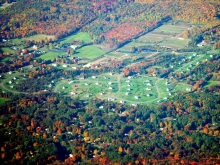You are here
New Study: Ecosystem Hotspots Increasing in Mass.

All land is not created equal. Ecosystem "hotspots" do triple duty in the benefits they provide to society. A new study published today in the Journal of Applied Ecology reports that the number of ecosystem hotspots has increased in Massachusetts over the past decade, with more and more hotspots popping up in metro Boston. But, the study points out, more hotspots may not be a good thing.
The study authors, Harvard doctoral student Meghan Blumstein and HF senior ecologist Jonathan Thompson, attribute the increase in hotspots to a degradation of ecosystems across Massachusetts. Over the 10-year study period (2001 to 2011), urban development increased by more than six percent, at the expense of forests and agricultural lands.
Using satellite maps, the team tracked changes in land cover – such as forest clearing for agriculture or development – across Massachusetts, 30 meters at a time. In each 30-meter grid square, they applied computer models to assess which benefits each ecosystem could provide, and how those benefits changed over time.
They found that some benefits, like wildlife habitat for ground species, declined state-wide over the study period. But benefits like carbon sequestration and outdoor recreation increased, because intact forests are growing rapidly, and more land is being conserved and made available for outdoor recreation like hiking and hunting.
Watch the video by study author Meghan Blumstein:
- Read stories from the Harvard Gazette, National Science Foundation,and the Associated Press.
- Browse the press release, photos, and original scientific paper.
- Learn more about the New England-wide research that has grown from this study.

